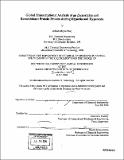| dc.contributor.advisor | Charles L. Cooney. | en_US |
| dc.contributor.author | Perry, William B | en_US |
| dc.contributor.other | Massachusetts Institute of Technology. Dept. of Chemical Engineering. | en_US |
| dc.date.accessioned | 2005-09-27T17:36:34Z | |
| dc.date.available | 2005-09-27T17:36:34Z | |
| dc.date.copyright | 2004 | en_US |
| dc.date.issued | 2004 | en_US |
| dc.identifier.uri | http://hdl.handle.net/1721.1/28666 | |
| dc.description | Thesis (Ph. D.)--Massachusetts Institute of Technology, Dept. of Chemical Engineering, 2004. | en_US |
| dc.description | Includes bibliographical references (p. 289-302). | en_US |
| dc.description.abstract | (cont.) The effects of recombinant protein production were observed through expression analysis of induced, uninduced, and Empty-Vector cultures. As expected, recombinant α₁AT production led to increased expression of heat-shock genes, including proteases and chaperones that are known to be involved in α₁AT degradation. Based on expression analysis data, production of recombinant α₁AT also resulted in catabolite repression and decreased amino acid biosynthesis. This work demonstrates the utility of DNA microarrays in analyzing and improving microbial fermentations. Global expression studies have suggested several strategies for increasing the resistance of bioprocesses to the damaging effects of oxygen and recombinant protein production. | en_US |
| dc.description.abstract | Both exposure to oxygen and recombinant protein production are known to have adverse effects on microbial fermentation, including increased proteolytic and oxidative damage to the product. In an effort to characterize the effects of these stresses on the cell, DNA microarrays were used to monitor global gene expression of E. coli producing recombinant human αl-antitrypsin (α₁AT) during exposure to defined aeration conditions. Recombinant α₁AT has been shown to undergo oxygen-dependent degradation during production in E. coli, due in part to activation of the heat-shock response. The goal of this work is to better understand the effects of oxygen in order to improve this recombinant protein production process. In order to study the effects of oxygen extremes, global expression analysis was performed on α₁AT-producing cultures exposed to pure nitrogen, air, and pure oxygen. The most notable effects of oxygen exposure were those of superoxide. This reactive oxygen species is generated upon oxygen exposure and is known to oxidize iron-sulfur clusters. In response to hyperoxic conditions, the SoxRS stress response was activated, as were genes involved in iron uptake and the Isc and Suf repair systems for Fe-S clusters. Supplementation of iron in the growth medium resulted in expression changes consistent with improved formation of Fe-S clusters. Iron supplementation also decreased superoxide stress at the expense of a short-term increase in the peroxide (OxyR) stress response. In addition, iron supplementation dramatically reduced the oxygen dependence of recombinant α₁AT degradation. Regeneration of Fe-S clusters is proposed to improve protein folding and clusters is proposed to improve protein folding and limit activation of the heat-shock response. | en_US |
| dc.description.statementofresponsibility | by William Bryon Perry. | en_US |
| dc.format.extent | 302 p. | en_US |
| dc.format.extent | 20492543 bytes | |
| dc.format.extent | 20532799 bytes | |
| dc.format.mimetype | application/pdf | |
| dc.format.mimetype | application/pdf | |
| dc.language.iso | en_US | |
| dc.publisher | Massachusetts Institute of Technology | en_US |
| dc.rights | M.I.T. theses are protected by copyright. They may be viewed from this source for any purpose, but reproduction or distribution in any format is prohibited without written permission. See provided URL for inquiries about permission. | en_US |
| dc.rights.uri | http://dspace.mit.edu/handle/1721.1/7582 | |
| dc.subject | Chemical Engineering. | en_US |
| dc.title | Global transcriptional analysis of an Escherichia coli recombinant protein process during hypoxia and hyperoxia | en_US |
| dc.type | Thesis | en_US |
| dc.description.degree | Ph.D. | en_US |
| dc.contributor.department | Massachusetts Institute of Technology. Department of Chemical Engineering | |
| dc.identifier.oclc | 58974215 | en_US |
